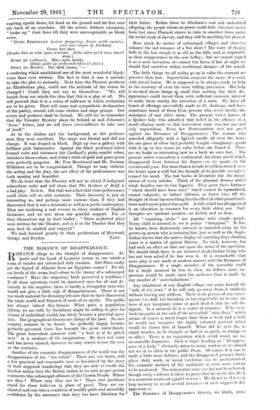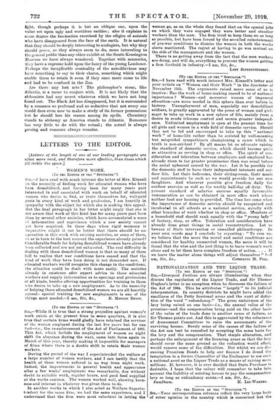THEROMANCE OF DISAPPEARANCE.
ROMANCE clings to the thought of disappearance. At- lantis and the Land of Lyonesse arouse in our minds a sense of wonder not untouched with emotion. Did Plato really get the legend of Atlantis from an Egyptian source ? Do the sea levels of the ocean lend colour to the theory of a submerged continent ? Have the migratory birds preserved a tradition ? If all these questions could be answered once for all and de- cisively in the negative, there is hardly a thoughtful man who would not give a little sigh of disappointment. There is not too much material for dreaming left now that we have discovered the whole world and disposed of most of its myths. The public has always valued day-dreams. What price a population (bitten, we are told, by Socialism) might be willing to give for visions of individual wealth has lately become a practical ques- tion. But geographical dreams are things of the past. No new country remains to be found. No perfectly happy because perfectly governed State lies beneath the great water-floods. The great benevolent autocrat with " a look as if he pitied men " is a creature of the imagination. He does not exist and has never existed, however we may search across the seas or the centuries.
Another of the romantic disappearances of the world was the disappearance of the " ten tribes." There are, one hears, still a few practical and reasonable men so fascinated by the story of their supposed wanderings that they are able to credit the baseless notion that the British nation in its own proper person represents this submerged offshoot of the Chosen People. Where are they ? Where may they not be ? Those two questions stand for these believers in place of proof. They are en- chanted and cast into a condition of worldly pride and unworldly confidence by the assurance that they too have Abraham for their father. Relate them to Abraham's real and undoubted offspring, the people whom no power could hide, who have never been lost since Pharaoh strove in vain to smother them under the awful cloak of slavery, and they will be anything but pleased.
How much do stories of submerged villages and churches enhance the sad romance of a flat shore ? The story of ringing bells in the lost steeple is as old as the hills, and as impossible as their reappearance in the new belfry ; but we cannot regard it as a mere invention, we cannot but listen if late at night we should find ourselves within traditional distance of the sound.
The little things we all mislay go up in value the moment we perceive their loss. Superstition connects the name of a saint with trivial losses. He is supposed to be always ready to help in the recovery of even the most trifling possession. His help is invoked about things au small that nothing but their dis- appearance could invest them with sufficient romantic interest to make them worthy the attention of a saint. We have all heard of offerings successfully made to St. Anthony, and have sometimes heard of them from persons who never invoke the assistance of any other saint. The present writer knows of a Quaker lady who admitted that belief in the efficacy of a small offering made to this benevolent saint was her one an only superstition. Even her Protestantism was not pro f against the Romance of Disappearance. The woman who searched diligently with a lighted candle all over the house for one 'piece of silver had probably bought—imaginary—goods with it up to five times its value before she found it. There are no books so interesting now as a book we once lost. The present writer remembers a sentimental American novel which disappeared from between his fingers—so to speak—in his seventeenth year. For more than a decade he seldom turned over the books upon a stall but the thought of its possible recapture crossed his mind. The lost books of literature stir the imagi- nation of every scholar. Think of the pleasant dreams which whole families owe to lost legacies. They grow these fortunes " which should have been ours," which cannot be squandered, cannot vulgarize, or induce idleness, or foster vice, till the thought of them has something like the effect of other proud trad tions and is more prized than gold. A title which has disappeared is an education in romance for every little eldest son. Such
are spiritual amulets—as foolish and as dear.
All " vanishing tricks " are popular with simple people. Every child is amused to see a penny "disappear." It has, he knows, been dexterously covered or snatched away by the grown-up person who is amusing him, just as well as the Anglo- Indian knows that the native display of vanishing boys climbing ropes is a matter of optical illusion. No trick, however, has had such an effect as that one upon the mind of the spectator. We should think there is no returned Anglo-Indian living who has not been asked if he has seen it. It is remarkable that more play is not made at modern seances with the Romance of Disappearance. If a single member of the assembly could for a single moment be lost to view, we believe more im- pression would be made upon the audience than is made by any number of " materialization."
Any inhabitant of any English village can make himself the " talk of the town " if he will only go away from it suddenly without leaving any address. There is no person of any conse- quence too dull, too harmless, or too respectable to become the hero of any imaginary crime or good deed if only he will dis- appear. In a moment he is a centre of romance. If he cane back incognito at the end of the proverbial " nine days," which means of course a much longer time than a week and a half, he would not recognize the highly coloured portrait which would be shown him of himself. What did he ever do, hi might wonder, to be thought so bad or so good, so strange or so silly ? There is no reputation which could stand an un- accountable departure. Such a vague heading as " Disappear- ance of a Lady " obviously attracts many readers or we should not see it so often in the public Press. Of course if it can he made a little more definite, and the disappeared person's birth- place, daily work, or social condition can be particularized, the romantic instinct of the multitude is even more certain to be awakened. The notion that some one has not been buried, though every evidence is there to prove that he or she has died, is a recurrent source of squalid ro:nance. We do net need a very long memory to recall several instances of such supposed dis• appearances.
The Romance of Disappearance throws, we think, some light, though perhaps it is but an oblique one, upon the value set upon ugly and worthless rarities ; also it explains in some degree the fascination exercised by the effigies of animals who have disappeared from the face of the earth. It is natural that they should be deeply interesting to zoologists, but why they should prove, as they always seem to do, more interesting to the general public than any other exhibit at the South Kensington Museum we have always wondered. Together with mummies, they have a supreme hold upon the fancy of the young Londoner. Perhaps the inexplicable comicality of the antediluvians may have something to say to their charm, something which might enable them to retain it even if they once more came to life and had to be confined in the Zoo.
Are there any lost arts ? The philosopher's stone, like Atlantis, is a name to conjure with. It is not likely that the alchemists had any secret whatevea which we have not long found out. The Black Art has disappeared, but it is surrounded by a romance so profound and so seductive that not every one would dare even now to make a study of its former pretensions lest he should lose his reason among its spells. Chemistry stands to alchemy as America stands to Atlantis. Romance has very little to do with the actual ; the actual is always passing and romance always remains.











































 Previous page
Previous page